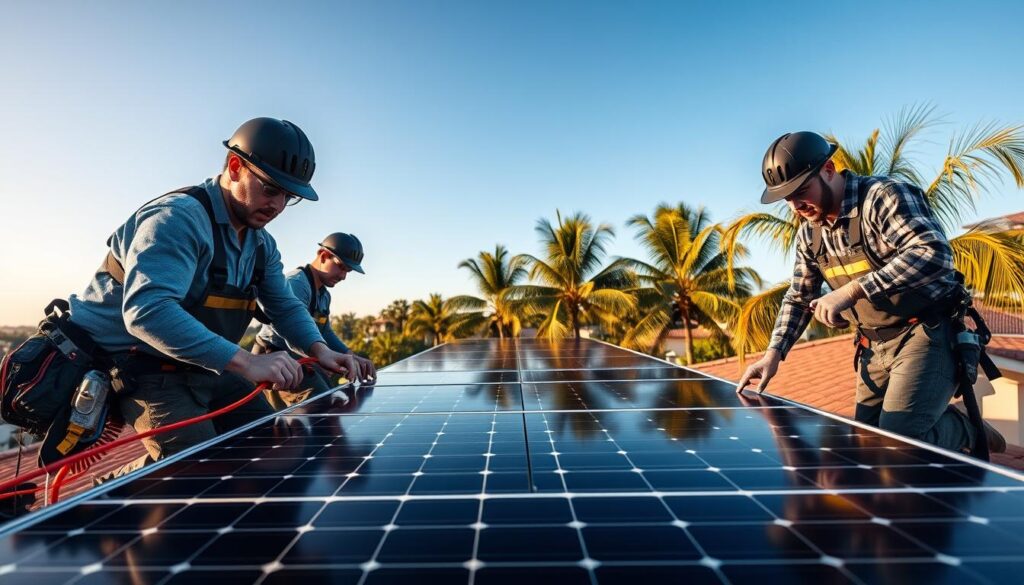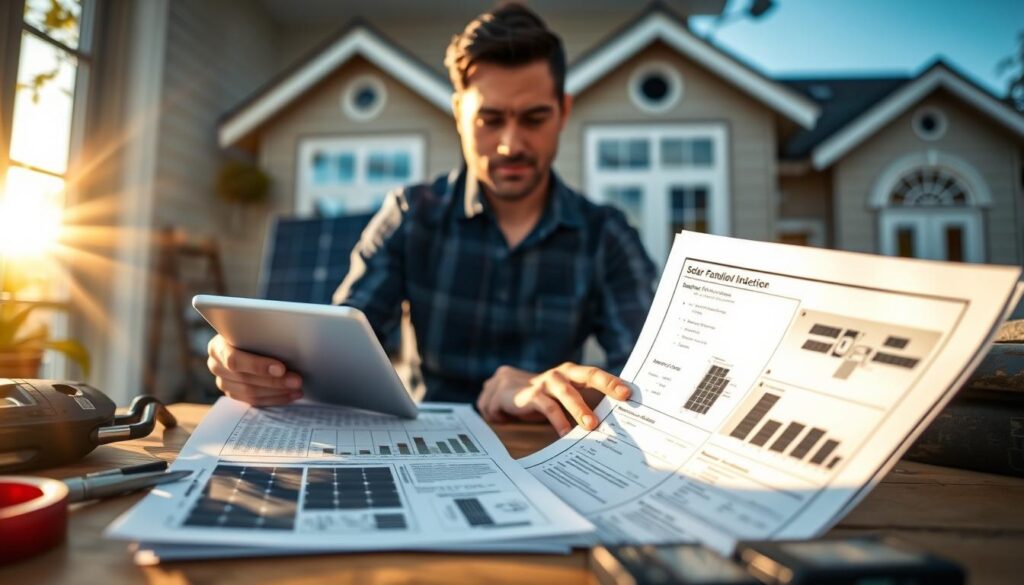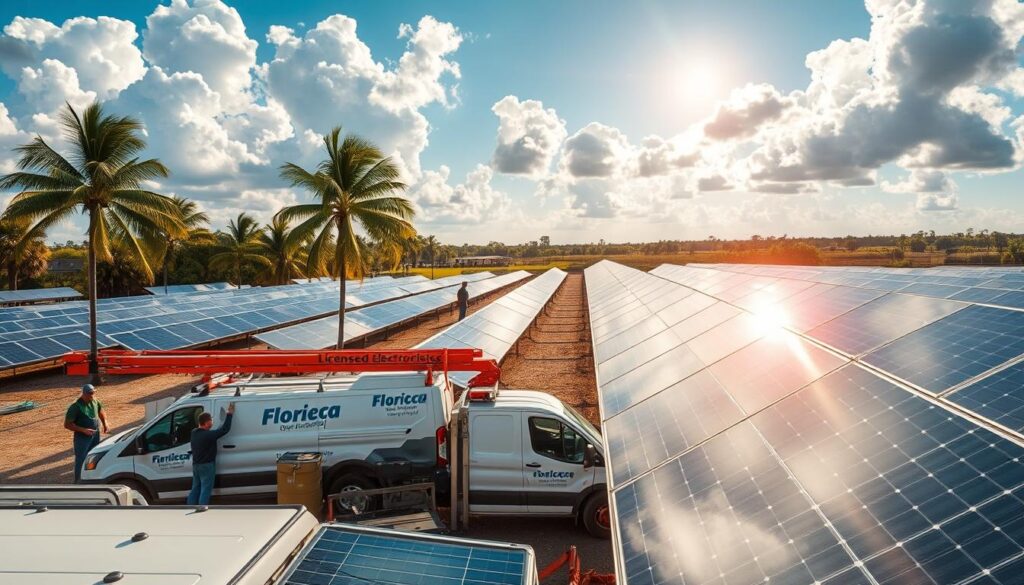Florida’s sunny climate makes solar energy a top choice for homeowners. But many wonder: can an electrical contractor install solar panels in Florida? Florida electrical contractor regulations require professionals to hold specific licenses. Since 2007, companies like Florida Power Services have been installing solar systems, proving licensed experts handle these projects safely. Solar Optimum in Tampa offers systems tailored to local needs. This guide explains requirements, benefits, and key steps for residents exploring solar options.
Florida’s solar industry has grown sharply, with U.S. solar energy contributions rising from 0.1% in 2010 to over 3% in 2023. Over 230,000 U.S. workers now specialize in solar, including licensed contractors in Florida. State rules mandate only licensed professionals—like master electricians or solar contractors—can install panels. Homeowners must choose certified teams to meet safety and legal standards.
Key Takeaways
- Only licensed contractors can legally install solar panels in Florida.
- Florida requires 3% of U.S. solar energy generation, up from 0.1% in 2010.
- Qualified installers must pass state exams held in February, June, and October.
- Net metering laws protect Floridians’ right to sell excess energy back to the grid.
- Solar Optimum and similar firms offer PPA programs to reduce upfront costs.
Understanding Solar Panel Installation
Going solar starts with knowing how these systems work and what they require. Solar energy contractors in Florida design solutions tailored to the state’s climate and energy needs. Here’s a breakdown of the basics.
What Are Solar Panels?
Solar panels are photovoltaic (PV) devices made of silicon cells. These cells capture sunlight and turn it into electricity. Types vary, but most homes use monocrystalline or polycrystalline panels. A standard system includes panels, inverters, and mounting hardware. Manufacturers often provide a 25-year warranty for performance guarantees.
- Components: Solar cells, frames, glass, wiring
- Efficiency: Modern panels convert 15-22% of sunlight into usable energy
- Warranty: Most panels carry 25-year output guarantees
How Do Solar Panels Work?
Light hits the panels, creating direct current (DC) electricity. An inverter then changes this to alternating current (AC) used in homes. Here’s the process step-by-step:
| Step | Action |
|---|---|
| 1 | Sunlight activates PV cells |
| 2 | DC electricity flows to inverter |
| 3 | Inverter converts to AC power |
| 4 | Power feeds home or grid |
Solar panel installation requirements include checking roof condition and local codes. Contractors must ensure panels face south for optimal sunlight. Shade or poor roof structure can delay projects. Florida’s mild winters make year-round installation possible, but permits take 2–6 weeks to secure.
The Role of Electrical Contractors
Electrical contractors play a crucial role in ensuring safe and efficient solar panel installations. As demand for solar grows—projected to rise 22% by 2031—choosing the right professional is vital. Their expertise bridges solar technology with home electrical systems.
What Do Electrical Contractors Do?
These experts handle every step of integrating solar energy into a home’s infrastructure. Key responsibilities include:
- Connecting solar arrays to existing electrical panels
- Managing wiring and circuit configurations
- Ensuring compliance with local building codes

Importance of Hiring Licensed Professionals
Working with licensed electricians for solar panels ensures safety and legal compliance. Florida law requires contractors to meet strict qualifications:
- Hold valid state licenses with required financial stability (e.g., $10,000 net worth for some licenses)
- Complete 14 hours of continuing education every two years
- Follow safety protocols to prevent electrical hazards
Unlicensed installers risk fines, system failures, or insurance voids. Proper electrical contractor qualifications guarantee work adheres to state regulations, protecting both property and finances.
Solar Panel Installation in Florida
Florida’s sunny climate makes it ideal for solar energy, with over 240 days of annual sunshine. To maximize benefits, homeowners must follow florida solar panel installation guidelines and partner with best solar panel contractors in florida. These steps ensure compliance and optimize energy output.
Florida’s Solar Incentives and Policies
State policies boost solar adoption through financial and regulatory support. Key incentives include:
- Net Metering: Excess energy fed back to the grid earns credits with utilities like Duke Energy and Florida Power & Light Company.
- Tax Exemptions: Solar systems are exempt from property and sales taxes, saving homeowners thousands.
- Rebates: Up to $20 per kWh for residential and commercial projects, plus PACE financing options.
- RPS Mandate: Utilities must source 20% of power from renewables by 2025, driving solar demand.
| Licensing Requirement | Details |
|---|---|
| Experience | 4 years work experience, 1 year as a foreman |
| Exam Fees | Certified Exam: $263.25; Retake: $67.25 |
| Credit Check | Applicants must submit credit reports with no delinquent accounts |
Best Practices for Solar Panel Placement
Proper placement boosts energy yield and durability. Key tips include:
- Orientation: South-facing panels maximize sun exposure in Florida.
- Storm Readiness: Use hurricane-resistant mounting systems to withstand strong winds.
- Shading Avoidance
: Ensure panels are free of tree or structure shadows during peak sunlight hours.
Choosing the best solar panel contractors in florida ensures compliance with state guidelines and optimal system performance. Verify licenses and certifications before hiring to protect your investment.
Choosing the Right Electrical Contractor
Selecting the best solar panel contractors in florida requires careful research. A reliable electrical contractor ensures your system meets safety codes and maximizes energy output. Start by verifying electrical contractor qualifications to avoid costly mistakes.
Key Qualifications to Look For
Top contractors hold credentials like the NABCEP certification and active Florida Solar Contractor Licenses. Look for firms with:
- General Liability and Workers’ Compensation Insurance
- Decades of experience in Florida’s unique building codes
- In-house teams for design, permitting, and installation
Check the Florida license board to confirm licenses. Reputable firms like Freedom Solar employ certified technicians and maintain up-to date certifications.

Questions to Ask Before Hiring
Ask these critical questions during consultations:
- Do you have a Florida-issued electrical contractor license?
- Will subcontractors handle any part of the project?
- What warranties cover materials and labor?
- Who manages local permit applications?
- What’s the typical project timeline?
- Are financing options available?
- Can you provide customer references?
Verify answers by checking BBB ratings and Google reviews. Ask to see past project photos and system performance data. Prioritize contractors offering 25+ year panel warranties matching solar panel lifespans.
Florida’s growing solar market means over 40% of top-rated installers now offer real-time energy monitoring systems. Always confirm certifications like NABCEP to ensure expertise in photovoltaic system integration.
The Installation Process
Installing solar panels involves clear steps to ensure safety and efficiency. Let’s break down each phase to simplify the journey from planning to energy savings.
Initial Consultation and Site Assessment
Contractors start with a thorough site visit. They assess roof condition, solar panel installation requirements like roof slope (15-40 degrees is ideal) and orientation (south-facing roofs maximize energy capture). During this phase, shading analysis and system sizing determine the best setup. A 20-25 year warranty period ensures long-term reliability, so precise design matters.
Permitting and Approvals
Before installation, secure solar panel installation permits from local authorities. Requirements include:
- City/county permits and passed inspections
- Proof of purchase with customer details
- Electrical one-line diagrams (signed by an engineer)
- Insurance documentation
Florida’s OUC requires all applications to be complete to avoid delays. Processing takes 4–6 weeks, so start early. Check HOA rules and utility agreements too.
Installation Steps Explained
Once permits are ready, installation begins. Steps include:
- Rooftop preparation and panel mounting
- Electrical wiring and inverter setup
- Final system testing
Companies like Freedom Solar use a streamlined “Seven Steps to Solar” approach, handling every detail. Installing in winter reduces weather delays and lowers costs. Post-installation, OUC’s 2030 policy changes ensure energy credits align with grid rates, so timing matters.
Cost Factors to Consider
Choosing the right electrical contractor ensures your solar project stays within budget. Can an electrical contractor install solar panels in Florida? Yes—but costs vary based on system size, panel type, and local florida electrical contractor regulations. Let’s break down the numbers.
Average Costs for Solar Panel Installation
System costs depend on size and efficiency. A 5kW setup starts at $10,548 before tax credits. Larger systems like 10kW can cost up to $21,097. Here’s the breakdown:
- Equipment: $0.50–$1.00/Watt
- Labor: $0.75–$1.50/Watt
- Permits: $500–$1,500
Electrical contractors must follow florida electrical contractor regulations, which can affect costs but ensure safety and compliance.
Potential Savings and ROI
A 5kW system saves $840–$1,120 yearly on bills. Over 25 years, that’s up to $28,000 in savings. The federal tax credit cuts costs by 30%, lowering a $35,000 system to $24,500.
“A properly installed system can boost home value by $20,000,” says the National Renewable Energy Lab.
Monocrystalline panels offer 15–22% efficiency, while thin-film panels last 20+ years. Factor in roof condition (adds 10–30%) and mounting systems ($700–$3,500).
With a 7.64-year payback period, solar pays off long-term. Compare quotes from licensed contractors to find the best price—up to 20% lower through platforms like EnergySage.
Maintenance and Support
“Don’t just take your money, then forget about you.”
Solar systems last up to 30 years when properly maintained. Regular upkeep keeps energy production high and prevents costly breakdowns. licensed electricians for solar panels are crucial for technical inspections, ensuring components like inverters and wiring stay in peak condition.

Importance of Regular Maintenance
Homeowners can clean panels and trim shading plants. But licensed electricians must handle electrical checks, inverter diagnostics, and system performance analysis. Florida’s hot climate accelerates wear on connections, making professional inspections vital every 1–2 years. Neglecting these steps risks voiding warranties or reducing efficiency by 10–20%.
Troubleshooting Common Issues
Common problems include:
- Output drops – Check for debris or shading first
- Inverter errors – Require licensed electricians to diagnose
- Monitoring alerts – Address promptly to avoid larger failures
When can an electrical contractor install solar panels in florida, they should also offer maintenance contracts. For example, inverters may show error codes needing professional repair. Avoid DIY fixes for electrical issues to stay compliant with Florida’s licensing laws.
Local Regulations and Permitting
Installing solar panels in Florida requires careful attention to florida solar panel installation guidelines and proper solar panel installation permits. These regulations ensure safety and compliance while streamlining the process. Let’s break down what homeowners need to know.
Navigating Florida Solar Regulations
The Florida Department of Environmental Protection (DEP) oversees energy policies that support solar adoption. Key rules include mandatory grid connection for all solar systems and net metering policies requiring utilities to credit excess energy. A solar panel installation permits ensure systems meet safety and efficiency standards. For instance, the DEP’s emergency plans even integrate solar tech to power essentials during outages:
“Solar energy technologies are critical for maintaining electric and water heating service during emergencies.”
Key Permitting Processes
Permitting steps vary by county but generally follow this flow:
- Application Submission: Submit forms to your local building department with electrical schematics and site plans.
- Fee Payment: Costs range widely—some counties charge $50, others up to $500.
- Review & Inspection: Solar PV systems take longer (up to 30 days) than solar water heaters, which often get same-day permits.
- Final Approval: Inspectors verify compliance before grid connection.
Contractors like Freedom Solar simplify this process by handling HOA approvals and permit applications. Always confirm local requirements, as some areas waive permits for minor repairs under $500. Staying informed keeps projects on track and avoids delays.
Safety Considerations
Solar panel installation demands strict adherence to solar panel installation requirements to avoid hazards. Licensed professionals ensure systems operate safely, preventing risks like electrical fires or system failures. Florida law requires certified contractors to handle solar work, safeguarding both homes and users.
Understanding Electrical Safety
Electrical systems carry high-voltage currents, making proper grounding and circuit protection critical. Licensed electricians for solar panels follow National Electrical Code standards, ensuring arc fault protection and safe disconnect points. Cutting corners can lead to lethal risks like electrical shocks or fires. Florida mandates certified contractors to handle these systems—unlicensed work risks fines up to $5,000 under state law.
“Licensed, bonded & insured with 100% satisfaction guaranteed.”
Protecting Your Property During Installation
Roof damage is a hidden risk. Improper mounting can weaken structures, causing leaks or collapse over time. Licensed installers assess roof load capacity and weatherproofing needs to prevent long-term harm. Proper installation also avoids voiding insurance coverage or rebates. For example, Florida’s solar incentives may be revoked if work isn’t done by licensed professionals.
- Roof inspections ensure structural integrity before drilling or mounting.
- Weatherproofing seals protect against moisture and corrosion.
- Electrical disconnects comply with fire and emergency response standards.
Professional installers like PPM Solar, trusted by over 1,100 Florida homeowners, ensure systems meet all safety and code requirements. Skipping licensed electricians risks fines, system failure, or insurance claim denials—costs outweigh any upfront savings.
Benefits of Solar Power in Florida
Switching to solar energy offers Florida homeowners both environmental and financial rewards. Let’s explore how clean energy transforms daily life and long-term savings.
Environmental Impact
Florida’s sunny climate makes it ideal for reducing reliance on fossil fuels. Solar energy contractors in Florida help residents cut carbon emissions by up to 3 tons annually per home. With 300+ sunny days yearly, solar systems here outperform many northern states, supporting the state’s goal to lower greenhouse gases.
Financial Benefits for Homeowners
Florida solar panel installation guidelines ensure systems maximize savings. Key perks include:
- 30% federal tax credit recouping upfront costs
- Net metering credits from utilities like Florida Power & Light and Tampa Electric
- Average annual bill reductions of $1,200
| Incentive | Details |
|---|---|
| Property Tax Exemption | No taxes on solar equipment |
| Sales Tax Waiver | Applies to certified solar panels |
| Net Metering | 1:1 credits for excess energy |
Pairing solar panels with batteries boosts energy independence during hurricanes. With electricity rates rising 2-4% yearly, solar locks in savings long-term. Start by consulting solar energy contractors in Florida to align installations with florida solar panel installation guidelines for optimal performance.
Conclusion
Electrical contractors in Florida are fully capable of installing solar panels, but success hinges on choosing licensed professionals. Florida’s sunny climate and incentives like the 30% federal tax credit make solar a viable option. The best solar panel contractors in Florida ensure installations meet local codes while optimizing energy output. With 230+ sunny days annually, systems like a 5-kW setup cost around $14,809 pre-credits, yielding long-term savings.
Final Thoughts on Electrical Contractors and Solar Panels in Florida
Florida homeowners save thousands over time: a 6-kW system cuts bills by $21,000 over 20 years. Contractors like Florida Power Services simplify the process, ensuring proper roof placement and compliance with state policies. Net metering credits reward excess energy, and tax incentives slash upfront costs. Systems last 25+ years, and warranties cover equipment and labor.
Begin by researching licensed contractors, comparing quotes, and verifying certifications. The best solar panel contractors in Florida provide transparency about warranties and permits. Their expertise helps homeowners leverage incentives like the federal tax credit, reducing costs by thousands. Florida’s solar growth makes it easier than ever to join the renewable energy movement. Start exploring options today to turn sunlight into savings and enhance your home’s value.
